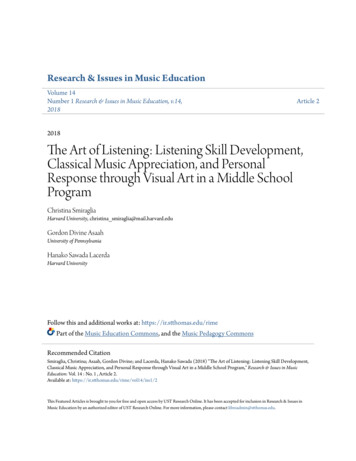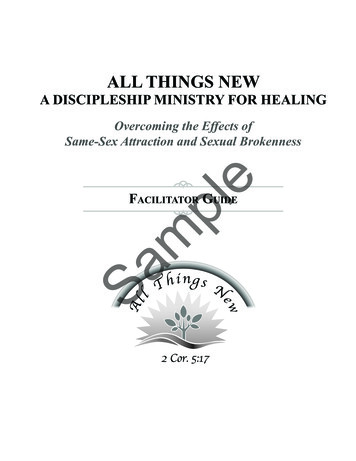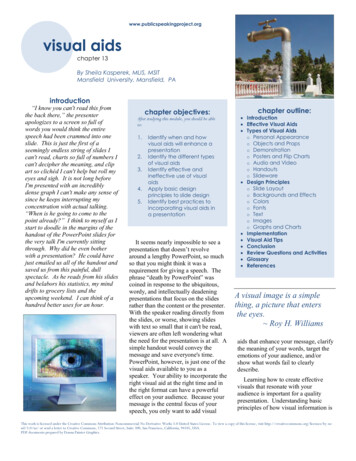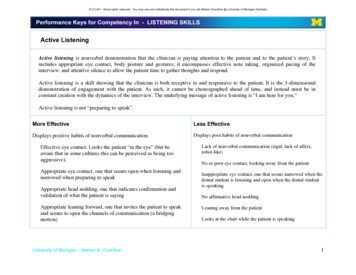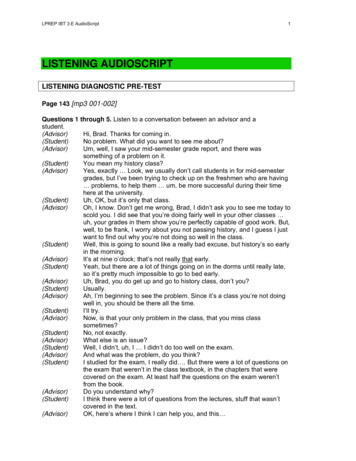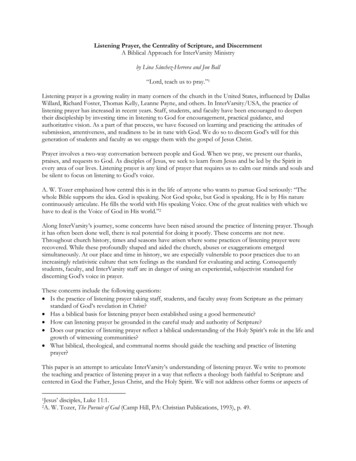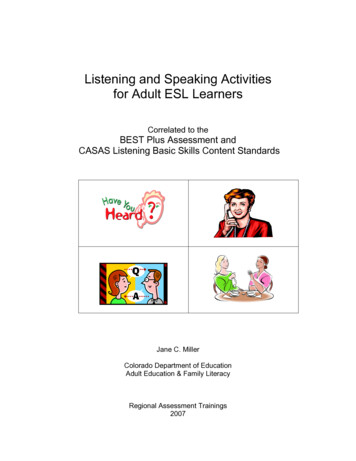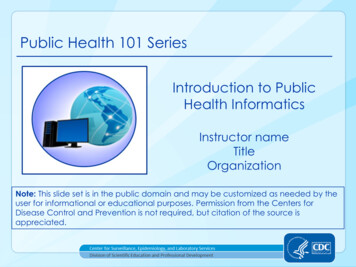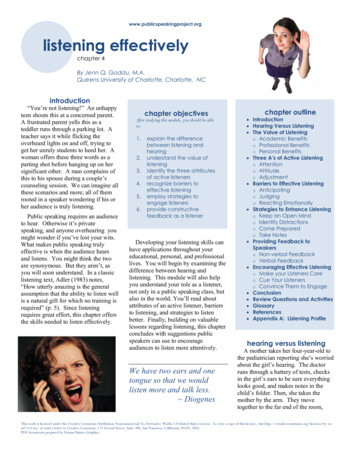
Transcription
www.publicspeakingproject.orglistening effectivelyPublic Speaking: The Virtual Textchapter 4By Jenn Q. Goddu, M.A.Queens University of Charlotte, Charlotte, NCintroduction“You’re not listening!” An unhappyteen shouts this at a concerned parent.A frustrated parent yells this as atoddler runs through a parking lot. Ateacher says it while flicking theoverheard lights on and off, trying toget her unruly students to heed her. Awoman offers these three words as aparting shot before hanging up on hersignificant other. A man complains ofthis to his spouse during a couple’scounseling session. We can imagine allthese scenarios and more; all of themrooted in a speaker wondering if his orher audience is truly listening.Public speaking requires an audienceto hear. Otherwise it’s privatespeaking, and anyone overhearing youmight wonder if you’ve lost your wits.What makes public speaking trulyeffective is when the audience hearsand listens. You might think the twoare synonymous. But they aren’t, asyou will soon understand. In a classiclistening text, Adler (1983) notes,“How utterly amazing is the generalassumption that the ability to listen wellis a natural gift for which no training isrequired” (p. 5). Since listeningrequires great effort, this chapter offersthe skills needed to listen effectively.chapter objectivesAfter studying this module, you should be ableto:1.2.3.4.5.6.explain the differencebetween listening andhearingunderstand the value oflisteningidentify the three attributesof active listenersrecognize barriers toeffective listeningemploy strategies toengage listenersprovide constructivefeedback as a listenerDeveloping your listening skills canhave applications throughout youreducational, personal, and professionallives. You will begin by examining thedifference between hearing andlistening. This module will also helpyou understand your role as a listener,not only in a public speaking class, butalso in the world. You’ll read aboutattributes of an active listener, barriersto listening, and strategies to listenbetter. Finally, building on valuablelessons regarding listening, this chapterconcludes with suggestions publicspeakers can use to encourageaudiences to listen more attentively.We have two ears and onetongue so that we wouldlisten more and talk less. Diogeneschapter outline Introduction Hearing Versus Listening The Value of Listeningo Academic Benefitso Professional Benefitso Personal Benefits Three A’s of Active Listeningo Attentiono Attitudeo Adjustment Barriers to Effective Listeningo Anticipatingo Judgingo Reacting Emotionally Strategies to Enhance Listeningo Keep an Open Mindo Identify Distractionso Come Preparedo Take Notes Providing Feedback toSpeakerso Non-verbal Feedbacko Verbal Feedback Encouraging Effective Listeningo Make your Listeners Careo Cue Your Listenerso Convince Them to Engage Conclusion Review Questions and Activities Glossary References Appendix A: Listening Profilehearing versus listeningA mother takes her four-year-old tothe pediatrician reporting she’s worriedabout the girl’s hearing. The doctorruns through a battery of tests, checksin the girl’s ears to be sure everythinglooks good, and makes notes in thechild’s folder. Then, she takes themother by the arm. They movetogether to the far end of the room,This work is licensed under the Creative Commons Attribution-Noncommercial-No Derivative Works 3.0 United States License. To view a copy of this license, visit / or send a letter to Creative Commons, 171 Second Street, Suite 300, San Francisco, California, 94105, USA.PDF documents prepared by Donna Painter Graphics.
Chapter 4 Listening Effectivelybehind the girl. The doctor whispers ina low voice to the concerned parent:“Everything looks fine. But, she’s beenthrough a lot of tests today. You mightwant to take her for ice cream after thisas a reward.” The daughter jerks herhead around, a huge grin on her face,“Oh, please, Mommy! I love icecream!” The doctor, speaking now at aregular volume, reports, “As I said, Idon’t think there’s any problem withher hearing, but she may not always bechoosing to listen.”www.publicspeakingproject.orga noise downstairs, an age-old selfpreservation response is kicking in.You were asleep. You weren’tlistening for the noise – unless perhapsyou are a parent of a teenager out pastcurfew – but you hear it. Hearing isunintentional, whereas listening (bycontrast) requires you to pay consciousattention. Our bodies hear, but we needto employ intentional effort to actuallylisten.event, attending a debate, or enduring asalesperson touting the benefits ofvarious brands of a product, we engagein critical listening. This requires us tobe attentive to key points that influenceor confirm our judgments. When weare focused on gaining informationwhether from a teacher in a classroomsetting, or a pastor at church, we areengaging in informational listening(Ireland, 2011).We regularly engage in severaldifferent types of listening. When weare tuning our attention to a song welike, or a poetry reading, or actors in aplay, or sitcom antics on television, weare listening for pleasure, also knownas appreciative listening. When weare listening to a friend or familymember, building our relationship withanother through offering support andshowing empathy for her feelings in thesituation she is discussing, we areengaged in relational listening.Therapists, counselors, and conflictmediators are trained in another levelknown as empathetic or therapeuticlistening. When we are at a politicalYet, despite all these variations,Nichols (1995) called listening a “lostart.” The ease of sitting passivelywithout really listening is well knownto anyone who has sat in a boring classwith a professor droning on about theNapoleonic wars or proper painmedication regimens for patientsallergic to painkillers. You hear thewords the professor is saying, whileyou check Facebook on your phoneunder the desk. Yet, when the examquestion features an analysis ofNapoleon’s downfall or a screamingpatient fatally allergic to codeine yourealize you didn’t actually listen.Trying to recall what you heard is aHearing is something most everyonedoes without even trying. It is aphysiological response to sound wavesmoving through the air at up to 760miles per hour. First, we receive thesound in our ears. The wave of soundcauses our eardrums to vibrate, whichengages our brain to begin processing.The sound is then transformed intonerve impulses so that we can perceivethe sound in our brains. Our auditorycortex recognizes a sound has beenheard and begins to process the soundby matching it to previouslyencountered sounds in a process knownas auditory association (Brownell,1996). Hearing has kept our speciesalive for centuries. When you areasleep but wake in a panic having heard4-2
Chapter 4 Listening Effectivelywww.publicspeakingproject.orgchallenge, because without yourattention and intention to remember,the information is lost in the caverns ofyour cranium.effectively in a team meeting.Ferrari (2012) identifies listening asthe “most critical business skill of all.”He notes, “listening can well be thedifference between profit and loss,between success and failure, between along career and a short one” (p. 2).Listening is one of the first skillsinfants gain, using it to acquirelanguage and learn to communicatewith their parents. Bommelje (2011)suggests listening is the activity we domost in life, second only to breathing.Nevertheless, the skill is seldom taught.personal benefitsthe value of listeningListening is a critical skill. Thestrategies endorsed in this chapter canhelp you to be a more attentive listenerin any situation.academic benefitsBommelje, Houston, and Smither(2003) studied effective listeningamong 125 college students and founda strong link between effectivelistening and school success,supporting previous research in thefield linking listening skills to gradepoint average. This finding isunsurprising as the better you listenwhile in class, the better prepared youwill be for your assignments andexams. It is quite simple really. Whenstudents listen, they catch theinstructions, pointers, feedback, andhints they can use to make theassignment better or get a better scoreon the test.Learning is a result oflistening, which in turn leadsto even better listening andattentiveness to the otherperson. Alice Millerprofessional benefitsConnecting listening skills to betterleadership, Hoppe (2006) lists manyprofessional advantages of activelistening, indicating that it helps us:better understand and makeconnections between ideas andinformation; change perspectives andchallenge assumptions; empathize andshow respect or appreciation, whichcan enhance our relationships; andbuild self-esteem. When people aren’tlistening, it becomes much moredifficult to get things done effectivelyand trust is broken while fosteringresentments. Bell and Mejer (2011),identifying poor listening as a “silentkiller of productivity and profit,” statechange becomes extremely difficult toimplement in a work environmentwhen people are not listening.Effective listening can also help youto make a better impression onemployers. This can begin at theinterview. You really want the job, butyou are really nervous. As a result, youare having trouble paying attention towhat the CEO of the company is sayingin your final interview. She asks you ifyou have any questions, and you asksomething you were wondering aboutin the elevator on the way up to thispenthouse office. You’re unlikely toget the job if you ask something she’sjust talked about. Even if you,somehow, convince her to hire you,you will make little progress at the firmif your supervisors often have to tellyou things again, or you makedecisions that cost the company in lostprofits because you weren’t listeningIf listening is done well, thecommunication loop is effectivelycompleted between speaker andreceiver. The speaker shares a messagewith the receiver, having selected aparticular method to communicate thatmessage. The receiver aims to interpretthe message and share understanding ofthe message with the speaker.Communication effectiveness isdetermined by the level of sharedinterpretation of the message reachedthrough listener response and feedback.When done successfully, the loop iscomplete, and both sender and receiverfeel connected. The active listener whoemploys the positive attributes detailedin this chapter is more likely to bebetter liked, in turn increasing her selfesteem. She is also likely to be betterable to reduce tension in situations andresolve conflict (Wobser, 2004). Afterall, the symbols for ears, eyes,undivided attention, and heart comprisethe Chinese character for “to listen”(McFerran, 2009, p. G1). Trulylistening to the words of a speaker issure to make a positive difference inyour interactions whether they areacademic, professional, or personal.4-3
Chapter 4 Listening Effectivelywww.publicspeakingproject.organd mentally summarize them(Nichols, 1957).the three A’s of activelisteningEffective listening is about selfawareness. You must pay attention towhether or not you are only hearing,passively listening, or activelyengaging. Effective listening requiresconcentration and a focused effort thatis known as active listening. Activelistening can be broken down into threemain elements.Know how to listen, and youwill profit even from thosewho talk badly. PlutarchHoppe (2006) advises activelistening is really a state of mindrequiring us to choose to focus on themoment, being present and attentivewhile disregarding any of our anxietiesof the day. He suggests listenersprepare themselves for active attentionby creating a listening reminder. Thismight be to write “Listen” at the top ofa page in front of you in a meeting.While reading a book, or having adiscussion with an individual, you cango back and re-read or ask a question toclarify a point. This is not always truewhen listening. Listening is of themoment, and we often only get to hearthe speaker’s words once. The keythen is for the listener to quicklyascertain the speaker’s central premiseor controlling idea. Once this is done,it becomes easier for the listener todiscern what is most important. Ofcourse, distinguishing the speaker’sprimary goal, his main points, and thestructure of the speech are all easierwhen the listener is able to listen withan open mind.attentionWe know now that attention is thefundamental difference betweenhearing and listening. Paying attentionto what a speaker is saying requiresintentional effort on your part. Nichols(1957), credited with first researchingthe field of listening, observed,“listening is hard work. It ischaracterized by faster heart action,quicker circulation of the blood, a smallrise in bodily temperature” (p. 9).Consider that we can processinformation four times faster than aperson speaks. Yet, tests of listeningcomprehension show the averageperson listening at only 25% efficiency.A typical person can speak 125 wordsper-minute, yet we can process up tothree times faster, reaching as much as500 words-per-minute. The poorlistener grows impatient, while theeffective listener uses the extraprocessing time to process thespeaker’s words, distinguish key points,attitudeEven if you are paying attention, youcould be doing so with the wrongattitude, the second A. Telling yourselfthis is all a waste of time is not going tohelp you to listen effectively. You’ll bebetter off determining an internalmotivation to be attentive to the personspeaking. Approaching the task oflistening with a positive attitude and anopen-mind will make the act oflistening much easier. Bad listenersmake snap judgments that justify thedecision to be inattentive. Yet, sinceyou’re already there, why not listen tosee what you can learn? Kaponya(1991) warns against psychologicaldeaf spots which impair our ability toperceive and understand things counterto our convictions. It can be as little asa word or phrase that might cause “anemotional eruption” causingcommunication efficiency to droprapidly (p. 194). For instance, someonewho resolutely supports military actionas the best response to a terrorist actionmay be unable to listen objectively to aspeaker endorsing negotiation as abetter tool. Even if the speaker iseffectively employing logic, drawingon credible sources, and appealing toemotion with a heartrending tale of thecivilian casualties caused by bombings,this listener would be unable to keep anopen mind. Failing to acknowledgeyour deaf spots will leave you at adeficit when listening.You will always need to make upyour own mind about where you stand– whether you agree or disagree withthe speaker – but it is critical to do soafter listening. Adler (1983) proposeshaving four questions in mind whilelistening: “What is the whole speechabout?” “What are the main or pivotalideas, conclusions, and arguments?”“Are the speaker’s conclusions soundor mistaken?” and “What of it?” Onceyou have an overall idea of the speech,determine the key points, and gaugeyour agreement, you can decide why itmatters, how it affects you, or what youmight do as a result of what you haveheard. Yet, he notes it is “impossible”to answer all these questions at thesame time as you are listening (p. 96).Instead, you have to be ready andwilling to pay attention to the speaker’spoint of view and changes in direction,patiently waiting to see where she isleading you.There are things I can't force.I must adjust. There are timeswhen the greatest changeneeded is a change of myviewpoint. Denis Diderot4-4
Chapter 4 Listening EffectivelyadjustmentTo do this well, you need the final ofthe three A’s: adjustment. Often whenwe hear someone speak, we don’t knowin advance what he is going to besaying. So, we need to be flexible,willing to follow a speaker along whatseems like a verbal detour down arabbit hole, until we are rewarded bythe speaker reaching his finaldestination while his audience marvelsat the creative means by which hereached his important point. If theaudience members are more intent onreacting to or anticipating what is said,they will be poor listeners indeed.Take time now to think about yourown listening habits by completing thelistening profile, adapted fromBrownell (1996) (see Appendix A).The next section will consider ways toaddress the challenges of listeningeffectively.barriers to effective listeningWe get in our own way when itcomes to effective listening. Whilelistening may be the communicationskill we use foremost in formaleducation environments, it is taught theleast (behind, in order, writing, reading,www.publicspeakingproject.organd speaking) (Brownell, 1996). Tobetter learn to listen it is first importantto acknowledge strengths andweaknesses as listeners. We routinelyignore the barriers to our effectivelistening; yet anticipating, judging, orreacting emotionally can all hinder ourability to listen attentively.anticipatingAnticipating, or thinking about whatthe listener is likely to say, can detractfrom listening in several ways. On onehand, the listener might find thespeaker is taking too long to make apoint and try to anticipate what thefinal conclusion is going to be. Whiledoing this, the listener has stoppedactively listening to the speaker. Alistener who knows too much, or thinksthey do, listens poorly. The onlyanswer is humility, and recognizingthere is always something new to belearned.Anticipating what we will say inresponse to the speaker is anotherdetractor to effective listening.Imagine your roommate comes todiscuss your demand for quiet fromnoon to 4 p.m. every day so that youcan nap in complete silence and utterdarkness. She begins by saying, “Iwonder if we could try to find a waythat you could nap with the lights on,so that I could use our room in theafternoon, too.” She might go on tooffer some perfectly good ideas as tohow this might be accomplished, butyou’re no longer listening because youare too busy anticipating what you willsay in response to her complaint. Onceshe’s done speaking, you are ready toenumerate all of the things she’s donewrong since you moved in together.Enter the Resident Assistant to mediatea conflict that gets out of hand quickly.This communication would have gonedifferently if you had actually listenedinstead of jumping ahead to plan aresponse.An expert is someone whohas succeeded in makingdecisions and judgmentssimpler through knowingwhat to pay attention to andwhat to ignore. Edward de BonojudgingJumping to conclusions about thespeaker is another barrier to effectivelistening. Perhaps you’ve been in theaudience when a speaker makes a smallmistake; maybe it’s mispronouncing aword or misstating the hometown ofyour favorite athlete. An effectivelistener will overlook this minor gaffeand continue to give the speaker thebenefit of the doubt. A listener lookingfor an excuse not to give their fullattention to the speaker will insteadtake this momentary lapse as proof offlaws in all the person has said and willgo on to say.This same listener might also judgethe speaker based on superficialities.Focusing on delivery or personalappearance – a squeaky voice, aketchup stain on a white shirt,mismatched socks, a bad haircut, or aproclaimed love for a band that no oneof any worth could ever profess to like– might help the ineffective listenerjustify a choice to stop listening. Still,4-5
Chapter 4 Listening Effectivelythis is always a choice. The effectivelistener will instead accept that peoplemay have their own individual foibles,but they can still be good speakers andvaluable sources of insight orinformation.reacting emotionallyWhen the speaker says an emotionaltrigger, it can be even more difficult tolisten effectively. A guest speaker oncampus begins with a personal storyabout the loss of a parent, and insteadof listening you become caught upgrieving a family member of your own.Or, a presenter takes a stance on druguse, abortion, euthanasia, religion, oreven the best topping for a pizza thatyou simply can’t agree with. Youbegin formulating a heated response tothe speaker’s perspective, or searingquestions you might ask to show theholes in the speaker’s argument. Yet,you’ve allowed your emotionalresponse to the speaker interfere withyour ability to listen effectively. Onceemotion is involved, effective listeningstops.www.publicspeakingproject.orgreturn to later. For now, you shouldkeep on listening.identify distractionsIn any setting where you areexpected to listen, you encounternumerous distractions. For instance,the father sitting in the living roomwatching television, might want to turnoff the television to better enable himto listen to his son when he comes intothe room saying, “Dad, I have aproblem.” In the classroom setting,you might be distracted sitting besidefriends who make sarcastic commentsthroughout the class. In a new productmeeting with the sales team, you couldbe unnerved by the constant beep ofyour phone identifying another text,email, or phone message has arrived.Identifying the things that will interruptyour attention, and making a consciouschoice to move to a different seat orturn off your phone, can help positionyou to listen more effectively.Bore, n. A person who talkswhen you wish him to listen. Ambrose Biercestrategies to enhancelisteningkeep an open mindThinking about listening might makeyou feel tense in the moment. Theeffective listener is instead calm with afocused and alert mind. You are notwaiting to hear what you want to hear,but listening to “what is said as it issaid” (Ramsland, 1992, p. 171).Effective listeners keep an open mind.Remember that listening to a point ofview is not the same as accepting thatpoint of view. Recognizing this canhelp you to cultivate a more openperspective, helping you to better adjustas you listen actively to a speaker.Also, it might help you to curtail youremotions. If you do encounter a pointthat incenses you, write it down tocome preparedAnother useful strategy is to comeprepared when you can. Any time youenter a listening situation with someadvance working knowledge of thespeaker and what might be expected ofyou as a listener, you will be better ableto adjust and engage more deeply inwhat is being said. For instance, youmight: read the assigned readings forclass, do the lab work before the lecturewriting up the results, read a biographyof a guest speaker before you go to anevent, review the agenda from theprevious staff meeting, or consult witha colleague about a client before goingon-site to make a sale.take notesTaking notes can also advance yourability to be actively engaged in thespeaker’s words. You need not writedown everything the speaker is saying.First, this is quite likely to beimpossible. Second, once you arecaught up in recording a speaker’severy word, you are no longer listening.Use a tape recorder instead – havingasked the speaker’s permission first – ifyou feel you really must capture everyword the speaker utters. You want tofocus your efforts on really listeningwith an active mind. Learning to focusyour attention on main points, keyconcepts, and gaining the overall gist ofthe speaker’s talk is another skill todevelop. You might endeavor to dothis by jotting down a few notes oreven drawing visuals that help you torecall the main ideas. The manner inwhich you take the notes is up to you;what is important is the fact that youare listening and working to processwhat is being said. Writing downquestions that come to mind and askingquestions of the speaker when it ispossible, are two more ways toguarantee effective listening as youhave found an internal motivation tolisten attentively.Education is the ability tolisten to almost anythingwithout losing your temper oryour self-confidence. Robert Frostproviding feedback tospeakersThere are many ways in which alistener can offer feedback to a speaker,sometimes even wordlessly. Keepingan openmind is something you dointernally, but you can also demonstrateopenness to a speaker through yournonverbal communication.4-6
Chapter 4 Listening Effectivelynonverbal feebackBoothman (2008) recommendslistening with your whole body, not justyour ears. Consider how confident youwould feel speaking to a room full ofpeople with their eyes closed, arms andlegs crossed, and bodies bent inslouches. These listeners arepresenting nonverbal cues that they areuninterested and unimpressed.Meanwhile, a listener sitting upstraight, facing you with an intent lookon his face is more likely to offerreassurance that your words are beingunderstood.Eye contact is another nonverbal cueto the speaker that you are payingattention. You don’t want to be bugeyed and unblinking; the speaker mightassume there is a tiger behind her andbegin to panic as you seem to be doing.However, attentive eye contact canindicate you are listening, and help youto stay focused too. There are somecultures where maintaining eye contactwould cause discomfort, so keep that inmind. Also, you may be someone wholistens better with eyes closed tovisualize what is being said. This canbe difficult for a speaker to recognize,so if this is you consider incorporatingone of the following nonverbals whileyou listen with eyes closed.www.publicspeakingproject.orgNodding your head affirmatively,making back-channel responses such as“Yes,” “Umhum,” or “OK” can helpthe speaker gauge your interest. Eventhe speed of your head nod can signalyour level of patience or understanding(Pease and Pease, 2006). Leaning in asa listener is far more encouraging thanslumping in your seat. Miller (1994)suggests the “listener’s lean”demonstrates “ultimate interest. Thisjoyous feedback is reflexive. Itphysically endorses our communiqué”(p. 184). Nevertheless, sending toomany nonverbal responses to thespeaker can go wrong too. After all, aconference room full of people shiftingin their seats and nodding their headsmay translate as a restless audience thatthe speaker needs to recapture.as a listener. For one, you have tolisten in order to be able to ask aquestion. Your goal should be to askopen-ended questions (“What do youthink about .?” rather than “Weshould do ., right?”). You can usequestions to confirm yourunderstanding of the speaker’smessage. If you’re not entirely sure ofa significant point, you might ask aclarifying question. These arequestions such as “What did youmean?” “Can you be more specific?” or“What is a concrete example of yourpoint?” These can help yourcomprehension, while also offering thespeaker feedback. When askingquestions, approach the speaker in apositive, non-threatening way. A goodlistener doesn’t seek to put the speakeron the defensive. You want todemonstrate your objectivity andwillingness to listen to the speaker’sresponse.Finally, paraphrasing what has beensaid in your interactions with thespeaker can be another useful tool for agood listener. Imagine the differenceif, before you respond to an upsetcolleague, you take a moment to say, “Iunderstand you are disappointed wedidn’t consult you before movingforward with the product release ”before you say, “we didn’t have time toget everyone’s input.” Reflecting backthe speaker’s point of view before yourespond allows the speaker to knowyou were listening ands helps fostertrust that everyone’s voice is beingheard.The only way to entertainsome folks is to listen tothem. Kin Hubbardverbal feedbackWhile speakers sometimes want allquestions held until the end of apresentation, asking questions when theopportunity presents itself can help you4-7
Chapter 4 Listening g effectivelisteningWilliam Henry Harrison was theninth President of the United States.He’s also recognized for giving theworst State of the Union address – ever.His two-hour speech delivered in asnowstorm in 1841 proves that a longspeech can kill (and not in thecolloquial “it was so good” sense).Perhaps it was karma, but after thePresident gave his meandering speechdiscussing ancient Roman history morethan campaign issues, he died from acold caught while blathering onstanding outside without a hat or coat(“William Henry Harrison,” 1989).Now, when asked what you knowabout Abraham Lincoln, you’re likelyto have more answers to offer. Let’sfocus on his Gettysburg Address. Thespeech is a model of brevity. His “ofthe people, by the people, for thepeople” is always employed as anexample of parallelism, and he kept hiswords simple. In short, Lincolnconsidered his listening audience whenwriting his speech.The habit of common andcontinuous speech is asymptom of mentaldeficiency. It proceeds fromnot knowing what is going onin other people's minds. Walter BagehotWhen you sit down to compose aspeech, keep in mind that you arewriting for the ear rather than the eye.Listeners cannot go back and re-readwhat you have just said. They need tograsp your message in the amount oftime it takes you to speak the words.To help them accomplish this, you needto give listeners a clear idea of youroverarching aim, reasons to care, andcues about what is important. Youneed to inspire them to want to not justhear but engage in what you are saying.make your listeners careHumans are motivated by ego; theyalways want to know “what’s in it forme?” So, when you want to want to getan audience’s attention, it is imperativeto establish a reason for your listenersto care about what you are saying.Some might say Oprah did this bygiving away cars at the end of anepisode. But, that only explains whypeople waited in line for hours to get achance to sit in the audience as hershows were taped. As long as theywere in the stands, they didn’t need tolisten to get the car at the end of theshow. Yet Oprah had audienceslistening to her for 25 years before shelaunched her own network. She madelisteners care about what she wassaying. She told them what was in thatepisode for them. She made heraudience members feel like she wastalking to them about their problems,and offering solutions that they co
Public Speaking: The Virtual Text teen shouts this at a concerned parent. introduction “You’re not listening!” An unhappy A frustrated parent yells this as a toddler runs through a parking lot. A teacher says it while flicking the overheard lights on and off, trying to get her unruly st
